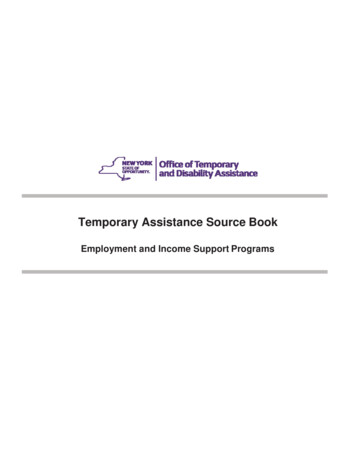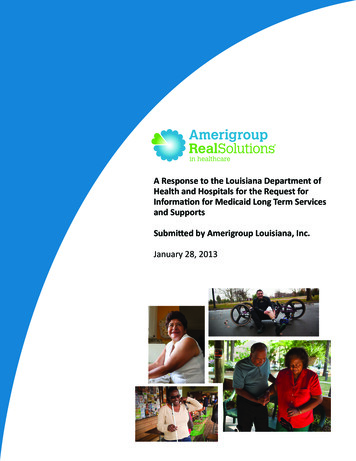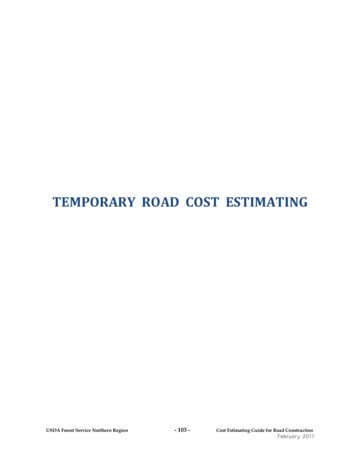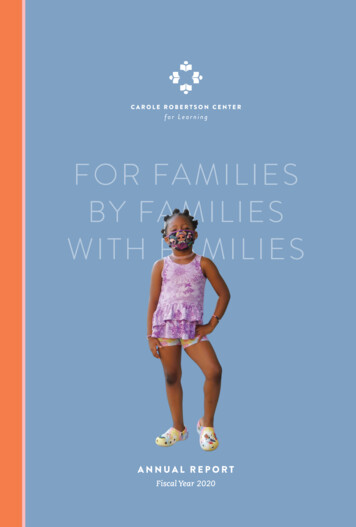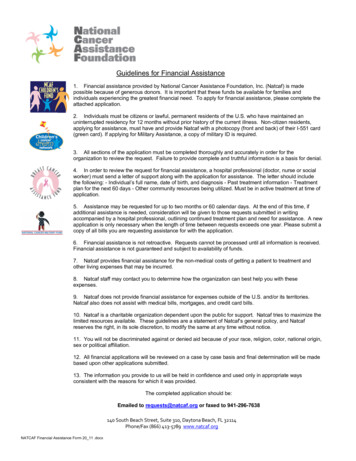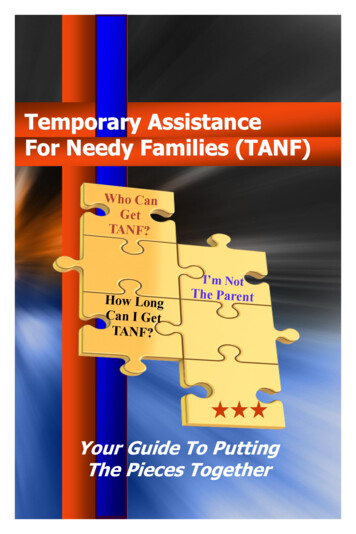
Transcription
Temporary AssistanceFor Needy Families (TANF)Who CanGetTANF?I’m NotHow LongCan I GetTANF?The ParentYour Guide To PuttingThe Pieces Together
2Helping families in tough times
3Table of ContentsWhat’s New in TANF!5Service Centers & Programs6Cash Help for Families8How to Apply for Cash Help9Documents You Should Bring10TANF Rules11What is the Time Limit on TANF?14Sanctions: What Happens If You Don’t Follow the Rules? 15Appeals: If You Think DHS Is Wrong16Legal Services17Exemptions: What Happens If You Can’t Work?18POWER: For People with Health Problems19Child Care Choices20Homeless Services Integration23Domestic Violence Help24Child Support Rules26Raising Children Who Aren’t Your Own30Benefits of Working While on TANF32What is Earned Income Credit?33Your Right to a Safe and Healthy Workplace35What if I Have a Physical or Mental Disability?36No Discrimination or Harassment37What if I Need to Miss or Leave Work Early?38TANF Partners39Help for Immigrants40Rules For Teen Parents42Service Center Waiting Rooms44Be Smart: Stay Organized45Additional Resources46Need To Report a Change?47
4NOTES
5What’sNew inTANF!The TANF program has changed to betterserve you. The Department of Human Services(DHS) has built a program to help you meet yourgoals and meet the needs of your family. Eachfamily is different and has different needs.The Orientation & Assessment. The TANFprogram includes an orientation that will inform allTANF customers of the program benefits andrequirements. It will also provide informationabout services to help you gain employment and become independent. Anassessment will be provided to all TANF customers to identify the most suitableservices. Completing the orientation and assessment is required for you to receivehelp and benefits from DHS.Helping you with Challenges. Services will be provided that match your goals,needs, and family circumstances. To receive a TANF benefit, you are also requiredto participate in activities. The activities are designed to help you find work, whichwill help you care for your family. There may be some challenges that make it hardor impossible to work. For people who have these challenges, we will work toprovide services to meet those needs. We will work with you so that you can getthe education, training, skills and services to help you overcome challenges thatmay have prevented you from working. DHS will help you through the process. Forexample, if someone has been unable to work because they have no child care, wewill help find child care. Then someone will check in with you and make sure thatyou have what you need to move to the next step in the process.TANF Employment Vendors. The TANF employment vendors will help you findjobs and connect with training or education programs. The vendors have dedicatedcase mangers to work with you, individually and help you make a plan that includesyour goals and interests. In the new TANF program you can only go to a vendor ifyou have been referred to them. The assessment will help us find the vendor thatbest fits with your needs and interests. You will not be able to switch betweenvendors unless DHS refers you to a new vendor or service provider. Severalsupport programs will be available to you, if needed, to ensure that you have thehelp you need.Participation Requirements. Once you are approved for benefits or referred to avendor, it is very important for you to meet your work or participation requirements.If you don’t participate for the required number of hours each week your benefitswill be reduced. If you continue missing your work or participation requirements,you will be cut off of TANF.We are working hard to build programs and services to help you reach your goals.We know that it is hard and we are here to help. But most importantly, success isin your hands.We wish you great success!
6ANACOSTIA SERVICE CENTER2100 Martin Luther King, Jr., Ave., SEWashington, DC 20020Telephone:(202) 645-4614Fax:(202) 727-3527TAYLOR STREET SERVICE CENTER1207 Taylor Street, NWWashington, DC 20011Telephone:(202) 576-8000Fax:(202) 576-8740CONGRESS HEIGHTSSERVICE CENTER4001 South Capitol Street, SWWashington, DC 20032Telephone:(202) 645-4525Fax:(202) 645-4524Virginia Williams Family ResourceCenter (VWFRC)33 N Street, NE,Washington DC 20002Telephone:(202) 526-0017Telephone:(202) 727-8871FORT DAVIS SERVICE CENTER3851 Alabama Avenue, SEWashington, DC 20020Telephone:(202) 645-4500Fax:(202) 645-6205CHANGE CENTERTelephone:(202) 727-6600Fax:(202) 535-1664H STREET SERVICE CENTER645 H Street, NEWashington, DC 20002Telephone: (202) 698-4350Fax: (202) 724-8964OFFICE OF MEDICAL ASSISTANCE(OMA)645 H Street, NEWashington, DC 20002Telephone:(202) 698-4220Fax:(202) 724-8963Monday thru Friday—8:15am-4:45pmOpen Wednesdays until 8:00pm
7ECONOMIC SECURITY ADMINISTRATIONESA ProgramsESA ProgramsTemporary Assistance for Needy Families (TANF) - Provides cashassistance to help heads-of-households meet the needs of children less than18 years of age who live with their parents or a relative. Multiple services tohelp TANF customers obtain and retain employment are also provided.Program on Work, Employment and Responsibility (POWER) Provides cash assistance to TANF recipients who are unable to work due totemporary medical problems.General Assistance for Children (GAC) - Provides cash assistance tohouseholds caring for unrelated children whose parents and other relativesare absent from the household and who do not or cannot provide financialsupport for the care of the child.Food Stamps - Provides monthly benefits to help eligible low-incomehouseholds buy food. A part of this program also helps customers obtain andretain employment.Medicaid - Provides federally-funded health insurance for eligible lowincome families, elderly and/or adults with disabilities.Alliance - Provides health insurance to needy District residents who do notqualify for federal Medicaid benefits. This includes non-disabled non-qualifiednon-citizen childless adults, and some individuals who are over income forMedicaid.Refugee Assistance - Provides temporary cash and medical assistance toqualifying persons from foreign countries seeking a safe place of refuge.Interim Disability Assistance (IDA) - Provides cash assistance to adultswith disabilities who have applied for and are awaiting a determination oftheir eligibility for Supplemental Security Income (SSI).Burial Assistance - Provides assistance to low-income families who needFor funeralmore informationabout ESA programs and serviceshelp withexpenses.Call (202) 671-4200For more information about ESA programs and servicesCall (202) 698-3900Vincent C. Gray, MayorDistrict of Columbiaincent C. Gray, MayorDC Department of Human Services, 64 New York Avenue, NE - 6th Floor,Washington, DC 20002David A. Berns, DirectorDepartment ofHuman Services
8Cash Helpfor FamiliesWho Can Get Cash Help?Families with children and pregnant woman can getcash help (TANF).See Page 6 or call 698-3900 to find the closest DHSService Center. Go to the Service Center to apply.You can get cash help for a child living in your home,even if the child is not yours.If you are not a relative of the child or CANNOT proveyou are family, ask for GAC (General Assistance forChildren). You can receive GAC if you are a godparentor family friend (see page 29).You and your family may be able to get:Cash help while you look for a job or while you are workingCash help while you recover from an illnessCash help while you move out of a situation of abuse in your homeCash help while you are getting treatment for drug or alcohol useCash help while you go to schoolCash help for an emergencyA job or job trainingHelp to find and pay for child careHelp to stay clean from drugs and sober from alcoholHelp getting child supportYou may be able to getMedical coveragefood stamps and medicalcoverage for your family,Food Stampseven if you cannot getcash help.
9How to Apply forCash HelpFill out the application. You only need to fill out one application forFood Stamps, Medicaid, TANF and/or GAC. Apply right awaybecause your benefits will date back to the day you first apply.Below is a list of documents you should bring to assist in aspeedy and accurate interview process.TANF ApplicationPhoto IdentificationTwo (2) Living with Statements (statement from non-familymember)Proof of ResidencyProof of Bank Accounts, or other resourcesProof of Income (earned or unearned)Birth Certificate of Children (Listing Parent’s names)Social Security NumbersProof of Child Care (cost)Visas, green cards, or immigration papers if you are not a UnitedStates citizens.REMEMBER:Apply right away. You can apply even if you do not have all ofthe documents.You will have time to get the documents you need after youapply.If after providing all of your documents, your worker says thatthe proof you gave is not enough, you can talk to a supervisor,call DHS, or call a lawyer for free help (see page 17).
10Below is a list of documents you should bring to the Service Center toassist in a speedy and accurate interview process.TANF ApplicationPhoto IdentificationTwo “Living with Statements” (statement from non-family member)Proof of Residency (DC Drivers License, utility bill, rent receipt, etc)Proof of Bank Accounts, or other resourcesProof of Income (Earned or Unearned)Birth Certificate of Children (listing parent’s names)Social Security Numbers (ST ? - DO YOU NEED ORIG. CARD?)TANF RecertificationProof of Residency (ST ? - DO YOU WANT TO REPEAT?0Proof of Income (Earned or Unearned)Proof Bank Accounts, or other resourcesFood Stamp ApplicationPhoto Identification (if no ID, Collateral Contact can be used)Proof of ResidencyProof of Income (Earned or Unearned)Proof of Household Expenses (Rent, Utilities, Phone and Medical)Proof of Child Care ExpenseProof of Bank Accounts, or other resourcesFood Stamp RecertificationProof of ResidencyProof of Income (Earned or Unearned)Proof of Household Expenses (Rent, Utilities, Phone and Medical)Proof of Child Care ExpenseProof of Bank Accounts, or other resourcesMedicaid ApplicationPhoto IdentificationProof of ResidencyProof of Income (Earned or Unearned)Birth Certificate of Children and Yourself or verification of U.S. citizenshipProof of Pregnancy (if applicable)Proof of Bank Accounts, or other resourcesProof of Disability from Social SecurityAdministrationMedical Report from PhysicianIMPORTANT: You can applyeven if you do not have thesedocuments with you. We willlet you know what you need tobring back to finish yourapplication.
11Rules To GetTANFThese are the TANF rules:1. You must have an orientation and an assessment.2. Orientation: We tell you how we can help and what you will needto do to get and keep TANF.3. Assessment. Your assessment will determine what customizedservices and referrals you need and what work activities will helpyou reach your goals.4. Your Plan: You will be required to do the activities listed in theplan that you and your case worker develop. The work activitieswill help you become independent and get prepared for a job.5. Child Care Support: We can help you get the support you needto take care of your family. Your worker may refer you to anagency to help get child support (see page 25).IIMPORTANT:You do not have to do work activities if you do not get TANF foryourself, for example, if you are a grandparent or get SSI.If you are not able to follow your plan, you must meet with yourcase worker to make a new plan. If you have good reasons fornot being able to follow your plan let your case worker know sothat you do not lose your cash help.Every 12 months that you receive TANF benefits, youwill be required to come in for a review.You will receive a letter asking you to come inor schedule a review.You must come in for the review in order tokeep your TANF benefits.If you do not come in for your 12-month reviewyour benefits will stop.
12TANF Rules (continued)TANF Work & Education RulesMost people have heard about the work rules for TANF.You must meet with a job counselor at an employment vendor. The jobcounselor will help you find a job or help you prepare for a new job.To receive TANF money, you need to do a “work activity” for 30 hourseach week (or 20 hours if your child is under six). You can work morehours if you want.Higher hours apply if you are a family with two parents who get TANF.You can do more than one “work activity” to meet the 30 hours perweek. For example, you can do “work experience” for 20 hours a weekand “education” for 10 hours a week.if you have reasons why you can’t do these work activities, talk to yourjob counselor. We will help you get the services you need.Work PlansYour job counselor will ask you about your work, education and goals.You and the counselor will make a work plan. The work plan is alsocalled an Individual Responsibility Plan (IRP).Your work plan will say what kind of work activities you must do to getTANF money and to prepare you for finding a job.EducationEducation counts as a work activity.Your job counselor or DHS worker canhelp you get money to finish high schoolor go to college.DHS has a program called the TuitionAssistance Program Initiative for TANF(TAPIT). TAPIT can give you up to 4,000each year for tuition, books, and fees.The Office of the State Superintendent of Education (OSSE) can helpyou apply for other financial aid to attend school. Talk with your caseworker or call (202) 727-2824.
13TANF Rules (continued)These things count as a work activity:WorkWork ExperienceEducation: GED classes, Adult Basic Education, CollegeVocational Education TrainingJob preparation or job searchCommunity Service ProgramsHelp with Work ExpensesIf you are doing a work activity, you will get help to pay forwork expenses like transportation or work clothes. Thishelp is called a “work allowance” or “stipend.”The travel stipend is 15 a day. To get the travel stipend, youneed to work or be in training at least four hours a day.You may also be able to get a “work allowance” to buy tools ora uniform for work.Tell your job counselor if you need help to get or continue yourjob, education, or training.REMEMBER:You and your job counselor will work together tochoose the goals that you need to meet.Think about activities you need to get a good job.If you do not follow what is in your plan, your TANFmoney may be cut.You can change your plan if your circumstanceschange. Let your job counselor know as soon as thishappens.
14What is the TimeLimit on TANF?Most people can now only get TANF money for 60months.60 months 5 yearsThe months you and your family received welfare moneybefore March 1, 1997 do not count. Only your time afterMarch 1, 1997 counts toward your 60 month time limit.Some caregivers, like grandparents, aunts, and uncles whoare receiving TANF just for children may be able to receiveTANF for longer than 60 months (see page 30).In the District, you may be able to get benefits for yourselfand your children for longer 60 months for certainexemptions. Talk with your case worker about this.TANF customers who have been on TANF for 60 monthsor more have received a 20% reduction in their TANFBenefit. Additional cuts may occur each year.If you have been on TANF for 60 months or more you willreceive priority scheduling for your orientation andassessment to enable you to receive the necessaryservices (see page 12). Call 202-698-1860 to scheduleyour orientation and assessment.
15Sanctions: What HappensIf You Don’t Follow TheRules?If you do NOT follow your plan or work requirements, yourTANF benefits will be cut, unless you have a good reason.This is called a sanction. The new sanction process isdescribed below.The first time you do not follow your plan for four (4) weeks,without a good reason you will receive a Level 1 Sanction. TheLevel 1 Sanction reduces your benefits by the head of householdportion (approximately 70).The second time you do not follow your plan for four (4 ) weeksyou will receive a Level 2 Sanction. The Level 2 Sanction reducesyour benefits by 50%.The third time you do not follow your plan for four (4) weeks youwill receive a Level 3 Sanction. The Level 3 Sanction cuts off yourTANF benefits entirely for 1 month. When you follow yourplan for four (4) weeks, and complete an updated assessment, youcan get TANF benefits again.If you have a good reason for not following your plan, your TANFMAY NOT be cut. See page 18 to see if this applies to you. Youmust let your worker or job counselor know about your reasonRIGHT AWAY.If you only get TANF for children, you do not have to do awork activity and your TANF benefits cannot be cut. Seepage 30.If you do NOT get a notice and your money is cut, call yourDHS worker, DHS Change Center at 727-6600, or call alawyer for free help.
16Appeals: If You Think DHS IsWrong.Sometimes we make mistakes. If you think DHS has made amistake, you can appeal. You must appeal within 90 days of thedate on your notice or letter. You can appeal when:You receive a notice of a change that you don’t agree withYour money, Food Stamps or health benefits stop comingYour money or your food stamp benefit is cut or loweredYour good reason for not doing a “work activity” was deniedor ignoredYour good reason for not helping Child Support wasdenied or ignoredYou don’t get the work allowanceWhen you appeal, you will have a “fair hearing”. A fair hearing is achance to tell your story. A special “hearing officer” reviews your fileand listens to your case.How To AppealThere are different ways to appeal:1. Call your caseworker and tell them that you want a FairHearing.2. Call the Office of Administrative Hearings at 442-9094 andtell them that you want a Fair Hearing.3. Write a letter and take it or mail it to:Your caseworker, ORThe Office of Administrative Hearings, 441 4th Street,NW, Room 450 North, Washington, DC 20001
17How to Appeal (continued)If you appeal before the effective date given in a letteror notice from DHS:You may be able to keep yourTANF money from being cut whileyou wait for a decision.If you appeal after the effectivedate given in a letter or notice from DHS:Your TANF money will be cut while you wait for a decision.You will get a decision on your case within 60 days of yourappeal.Remember:Turn in your appeal right way.You can appeal a decision up to 90 days after the date of anotice.You can get free legal services from manyplaces.For free legal help, call:Legal Aid Society of DCWashington Legal Clinic for the HomelessBread for the City Free Legal Clinic(202) 628-1161(202) 872-1494(202) 265-2400
18Exemptions:What Happens IfYou Can’t Work?You can be excused from working if you have agood reason. If you do not work and you do nothave a good reason, your money will be cut.You Do Not Have to Work If:You are 19 or older and have a child under one year old.You have a child under age 6 and you cannot find child carethat you can pay for or that is close to your home. DHS canhelp you find and pay for child care (see page 20).You are injured or disabled (you may be able to switch tothe POWER program).You need to take care of someone in your house who is ill ordisabled.You are over the age of 60.You need treatment for drug or alcohol use and you cannotwork.You are a teen parent attending school.You are afraid you or your family will be hurt by domesticviolence if you work.If you have one of these reasons, you do not haveto work, but you can if you want to.You need to show proof of your reason. Tell yourworker your reason if you cannot work.If you need child care, call your job counselor, DHSCustomer Service or the Child Care Connection at(202) 862-1111.
19POWER:For People WithHealth ProblemsPOWER is a program for families in which the parents havephysical or mental disabilities that keep them from working.For example, parents with these problems might beeligible to enroll in the POWER program:A heart problemDrug addictionAlcohol dependencyClinical depressionPOWER gives you the same amount of money as TANF.You can get POWER as long as you need it.POWER participants must go to programs to help them get readyfor work, like rehabilitation or drug treatment programs.What You Need to Do to Get Into the POWER ProgramYou must first get TANF before you can get POWER.Tell your worker you want to be in the POWER Program.Ask your worker to give you a medical form. Take the form to yourdoctor.Return the form to your worker.You do not have to work or do a work activity while you wait to findout if you will be in the POWER program. You CANNOT lose TANFwhile you wait.Even if you don’t get into the POWER program, you can still get TANFmoney. If it is determined that you cannot be in the POWERprogram, the months you are on TANF will count on your 60-monthclock.
20ChildCareIf you are receiving TANF benefits and are following your Plan, youmay be able to get help to pay for child care. This is called ‘child caresubsidy’ or a ‘voucher’. Depending on your income and household size,you may have to pay part of the cost of your child care. This is called a‘copayment.’You can get help to care for a child from the age of 6 weeks up to 12years old, or for a child up to the age of 18 who has a physical or mentaldisability.You may be able to get a child care ‘voucher’ even if you are animmigrant who does not qualify for TANF.You choose from different child care settings.The Child Care Services Division will help you find spot and select afacility for your child.You can choose from:A Licensed Child Care CenterA Licensed Family Home CenterA Before and/or After School ProgramA family or friend approved to give careTo get the child care ask your TANF caseworker or your job counselor for theReferral Form and medical forms for your child (Department of HealthUniversal Child Health Certificate). Take the medical form to your child’s doctor to be completed. The medical form must have up-to-date physical exam and current shotinformation. The TANF Referral Form must be current within thirty days. For more information call the Child Care Services Division (CCSD) at (202)727-0284.
21REMEMBER:For help finding child care, call the Child CareConnections at (202) 862-1111.If you can’t find child care, tell your job counselorimmediately.If your child is under 6 years old and you can’t findchild care, you may be excused from doing a work,school or training activity until you find child care, butyou MUST tell your job counselor immediately.Your TANF money CANNOT be cut off if you tried toget child care, but could not.If your money is cut off, you can fight it. Call DHSCustomer Service, or see page 17 to find a lawyer forfree help.Child Care Choices (Options)1. Child Care Centers (nursery schools and preschools)The Centers must be licensed and follow the rules of the DCLicensing Office for a clean and safe place with activities foryour child’s age.The staff are trained to respond to children’s changing needsas they grow.The Child Care Connections also known as Resource andReferral can assist with a list of child care providers approvedto use vouchers. The telephone number is (202) 862-1111.2. Family HomesThe Family Home Providers are licensed and can take care ofup to five children, but not more than two children under theage of two.The Child Care Connections also known as Resource andReferral can assist with a list of Family Home Providersapproved to use vouchers.
22Child Care Choices (continued)3.Before and After School CareChildren who go to school (ages 5 to 12) may need careBefore and/or After School.The Child Care Connections also known as Resource andReferral can assist with a list of Before and After Schoolproviders approved to use vouchers.4. Care By a Relative or FriendIf you can’t find a licensed child care of family home centeryou might be able to use a Relative or Friend.Relative Home Care (RHC) can be given in the home of thechild or the relative.Care by a Friend must be given in the child’s home.The RHC or IHC provider can get paid by the governmentfor taking care of your child.The person you select does not need a license.The RHC and IHC can take care of up to five children, butnot more than two children under the age of two.This is the day care choice of last resort and must beapproved to get money to pay for it.
23HomelessServices IntegrationDHS has combined some of its programs tomake getting services easier.The Virginia Williams Family Resource Center is an integrated servicecenter for families living in the District. Families who are homeless canvisit Virginia Williams to apply for:Homeless services including:Emergency Rental AssistanceHousing ResourcesTemporary ShelterCommunity ResourcesPublic benefits including:TANFFood StampsMedicaidChildcare Subsidy for families working on their TANF goals.The Virginia Williams Family Resource Center has recently moved.The Virginia Williams Family Resource Center is now located at33 N Street, NE, Washington, DC 20002(202) 526-0017Hypothermia Season: November 1st through March 31stDuring Hypothermia Season, Virginia Williams Family Resource Centeris also a warming center. If you or someone you know is in need ofEmergency Shelter, please call the Hypothermia/HyperthermiaHotline, available 24 hours a day: 1 (800) 535-7252.Homeless Services TANF Assistance Child CareServices under one roof!
24DomesticViolence HelpWhat is Domestic Violence?Domestic violence is when someone close to you or in yourfamily hurts you or the children in your care. Domestic violenceis:Physical abuse such as pushing, hitting, punching,slapping, kicking, strangling, cutting, stabbing, burning,biting, not letting you go to the doctor, or threatening todo any of these things.Sexual abuse such as touching you or your child in asexual way or touching you without your permission,forcing you to have sex, or threatening to do any of thesethings.Mental abuse such as threatening you, making youafraid or controlling your actions.You can get help like housing, counseling, and legalassistance for your family if violence happens inyour family. To find out where to get help, callEFFORTS at (202) 232-7322 or (202) 629-2720.
25Domestic Violence Help (continued)If You Have Experienced Domestic ViolenceYou will still receive TANF.You may not have to work for a short time.A community group will help you make a plan to deal withthe abuse.You have to do the things in your plan.Your plan has a time limit. Ask your worker for more time ifyou need it.You may not have to help DC get child support for yourchildren. Look at the Child Support section on page 25 tolearn more.How You Can Be Excused From WorkingTell your worker about the abuse that you or your child(ren)have gone through.Your worker will send you to a new office to get help. Besure to go to this meeting!In two weeks, your worker will tell you if you have toparticipate in work activities.You do not have to work while you wait to hear from yourworker.Your money CANNOT be cut while you wait.
26Child SupportRulesThere are new rules for child support:You CAN receive both TANF and a portion of your Child Support atthe same time.To receive TANF you may need to help the Child Support ServicesDivision (CSSD) collect child support from the other parent.Child Support Services Division (CSSD) staff will ask you to:1. Meet with them at the CSSD office. If you can’t attend, call CSSDat 442-9900 to set up a new meeting.2. Provide information about the other parent, such as:Social Security NumberBirth dateAddressRelative’s addressPlace of workIf you miss meetings at CSSD or don’t provide information,your TANF money can be reduced.You may not have to help CSSD if you have a good reason. Ifyou have a good reason, your TANF money CANNOT be cut.You have Good Reasons if:You are afraid that you, your children or a close family membercould be harmed from domestic violence if you help CSSD.Your child was conceived because of a rape by a stranger, someoneyou know, or a relative.Your child is going to be adopted or you are deciding whether togive up your child for adoption.You may have other good reasons. Discuss them with you DHS orChild Support worker.For more information about child support, call theNational Women’s Law Center at (202) 588-5180. Askfor the booklet “Making Ends Meet: A Guide toCollecting Child Support.”
27Child Support Rules (continued)If You Have A Good ReasonTell your DHS worker and your Child Support worker AND:If you have a stay-away order or Civil Protection Order (calleda “CPO”), give a copy to your DHS and Child Support workers.If you want to get an order, go to the Domestic ViolenceIntake Center on the fourth floor of the DC Superior Court orCall 879-0152 to set up a meeting.Provide Proof. You have 20 days to take proof of yourreason to the Child Support Services Division. Proof is:A police record.A copy of your stay-away order (CPO).A letter from your doctor, counselor, or other person that youtalked to about the abuse.A letter from a friend or family member who knows aboutthe abuse.Pictures showing the injuries or scars of the abuse.A sworn letter from you about the abuse.Letter from a social worker or adoption agency if you areplacing your child up for adoption.Birth certificate, police record, or other record that your childwas conceived during a rape.After you give proof, CSSD will let you know if you must helpthem obtain child support.If CSSD tells you to help them but you think you have agood reason not to help, you can appeal. Call the Office ofAdministrative Hearings at (202) 724-5431. You can alsocall a lawyer for free help (see page 16).
28Child Support Rules (continued)If You Are Worried About Your Safety But Decide That YouWant Child Support Anyway:You can ask your TANF worker for the name of a group that canhelp (see page 23).Tell your TANF and Child Support workers that you are afraid butwant to get child support.If you want to get a stay-away order or you already have one, goto the Domestic Violence Intake Cent
7 incent C. Gray, Mayor ESA Programs For more information about ESA programs and services Call (202) 671-4200 ESA Programs Temporary Assistance for Needy Families (TANF) - Provides cash assistance to help heads-of-households meet the needs of children less than
